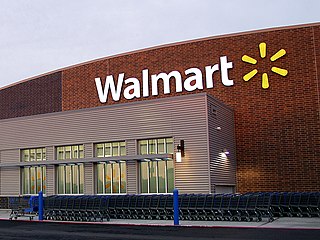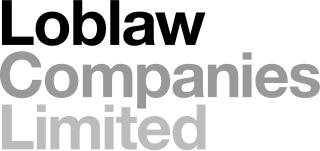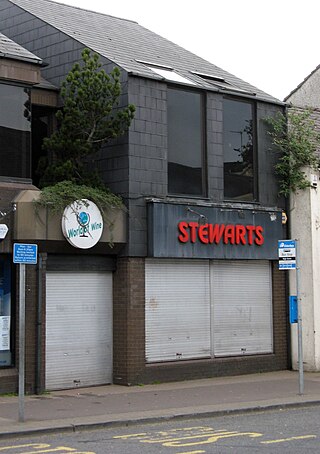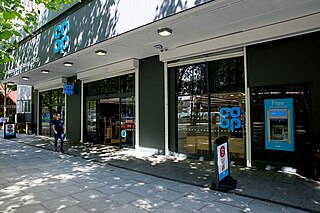
A supermarket is a self-service shop offering a wide variety of food, beverages and household products, organized into sections. This kind of store is larger and has a wider selection than earlier grocery stores, but is smaller and more limited in the range of merchandise than a hypermarket or big-box market. In everyday United States usage, however, "grocery store" is often used to mean "supermarket".
Tesco plc is a British multinational groceries and general merchandise retailer headquartered in Welwyn Garden City, England. The company was founded by Jack Cohen in Hackney, London in 1919. In 2011, it was the third-largest retailer in the world measured by gross revenues and the ninth-largest in the world measured by revenues. It has shops in Ireland, the United Kingdom, the Czech Republic, Hungary, and Slovakia. It is the market leader of groceries in the UK.

A grocery store (AE), grocery shop (BE) or simply grocery is a foodservice retail store that primarily retails a general range of food products, which may be fresh or packaged. In everyday U.S. usage, however, "grocery store" is a synonym for supermarket, and is not used to refer to other types of stores that sell groceries. In the UK, shops that sell food are distinguished as grocers or grocery shops

Loblaw Companies Limited is a Canadian retailer encompassing corporate and franchise supermarkets operating under 22 regional and market-segment banners, as well as pharmacies, banking and apparel. Loblaw operates a private label program that includes grocery and household items, clothing, baby products, pharmaceuticals, cellular phones, general merchandise and financial services. Loblaw is the largest Canadian food retailer, and its brands include President's Choice, No Name and Joe Fresh. It is controlled by George Weston Limited, a holding company controlled by the Weston family; Galen G. Weston is the chair of the Loblaw board of directors, as well as chair of the board of directors and CEO of Canada-based holding company George Weston.
Sobeys Inc. is a national supermarket chain in Canada with over 1,500 stores operating under a variety of banners. Headquartered in Stellarton, Nova Scotia, it operates stores in all ten provinces and accumulated sales of more than C$25.1 billion in the fiscal 2019 operating year. It is a wholly owned subsidiary of Empire Company Limited, a Canadian business conglomerate.

Willard Gordon Galen Weston was a British-Canadian billionaire businessman and Chairman Emeritus of George Weston Limited, a Canadian food processing and distribution company. Weston and his family, with an estimated net worth of US$8.7 billion, are listed as the third wealthiest in Canada and 178th in the world by Forbes magazine.

Waitrose Limited, trading as Waitrose & Partners, is a brand of British supermarkets, founded in 1904 as Waite, Rose & Taylor, later shortened to Waitrose. It was acquired in 1937 by employee-owned retailer John Lewis Partnership, which still sells groceries under the brand. Its head offices are located in Bracknell, Berkshire.
Quinnsworth was a supermarket chain that operated in Ireland from 1966 to 1997. During its time in operation, it grew to be one of Ireland's leading retailers, with approximately one quarter of the grocery market in the Republic of Ireland, and some 88 supermarkets across the island of Ireland, including its Crazy Prices brand operated at some of its larger outlets. It was acquired by UK chain Tesco in 1997, with its supermarkets being gradually rebranded as Tesco Ireland over the following four years.
Tesco Ireland Limited is the Irish subsidiary of supermarket group Tesco. Tesco Ireland was formed by Tesco plc's 1997 purchase of the Irish retailing operations of Associated British Foods, namely Powers' Supermarkets Limited and its subsidiaries, trading as Quinnsworth and Crazy Prices. There are 152 Tesco stores in operation in Ireland as of August 2018. Tesco had approximately 21% of the Irish grocery market in 2019 and its main competitors are Dunnes Stores and SuperValu.

President's Choice or PC is a line of grocery products and services offered by the Canada-based Loblaw Companies Ltd.

Franklins was an Australian discount supermarket chain selling packaged groceries and perishables throughout New South Wales, Queensland, Victoria and South Australia. It sold the "No Frills" home brand generic products. In 2011 the chain was bought by Metcash and the stores were sold off, shut down or converted into new supermarket banners or other brands. The final store closed in April 2015.
No Frills is a Canadian chain of discount supermarkets, owned by Loblaw Companies Limited, a subsidiary of George Weston Limited. There are over 200 franchise stores located in nine Canadian provinces.

No Name is a line of generic brand grocery and household products sold by Loblaw Companies Limited, Canada's largest food retailer. No Name products are available in stores across Canada that include Loblaws, No Frills, Dominion, Real Canadian Superstore, Your Independent Grocer, Valu-mart, Zehrs, Fortinos, Provigo, Extra Foods, Super-Valu, Maxi, Atlantic Superstore, and Shoppers Drug Mart.

Fine Fare was a chain of supermarkets which operated in the United Kingdom from 1951 until 1988. During the 1960s the company was the largest operator of supermarkets in Europe. Their Yellow Pack budget own-label range, introduced in 1980, was the first own brand basic range to be introduced in the UK and in 1983 it was the first British supermarket to sell organic food. The business for the majority of its existence was owned by companies controlled by Garfield Weston and his family, but were sold in 1986 to the Dee Corporation, operators of Gateway Foodmarkets with the stores being rebranded.

Stewarts Supermarket Limited was a supermarket chain in Northern Ireland. The chain was purchased by Tesco in March 1997.
Price Chopper was part of the Woolworths New Zealand Supermarket Group, alongside Woolworths and Big Fresh.
Tesco.com is an electronic commerce website operated by Tesco. It offers a wide range of other products, including electronic goods, books, broadband and financial services. Tesco closed their Tesco Direct website in 2018.
Jewel Food Stores was an Australian discount supermarket. It operated from 1960 to 1998 with the final stores being absorbed into the Metcash owned IGA branding. The chain was originally owned and operated by the Fleming family. It was not related to the Jewel supermarket chain in the United States.

Co-op Food is a brand used for the food retail business of The Co-operative Group in the United Kingdom.
In the United Kingdom, it is common practice for retailers to have their own value brand in an effort to compete on price. These brands have become more popular in the UK with shoppers since the Great Recession caused food prices to rise.










